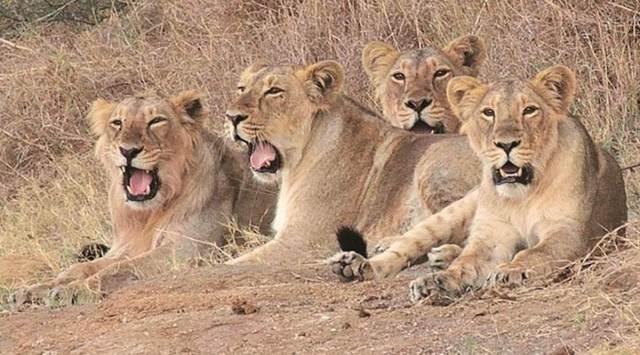Policymakers should look at Asiatic lions as resource, not asset: Gujarat top forest officer
Tikadar, also the Principal Chief Conservator of Forest (PCCF), was speaking at a webinar on conservation of Asiatic lions organised by the Central Zoo Authority on World Lion Day.
 He warned that the current conservation strategy of relying on tolerance of communities was like “sitting on a time bomb”. (File)
He warned that the current conservation strategy of relying on tolerance of communities was like “sitting on a time bomb”. (File)Policy-makers should start looking at Asiatic lions as a “resource” which local communities can “earn money from” and not an asset, Gujarat’s Chief Wildlife Warden, Shyamal Tikadar, said Monday, adding that around 80 per cent of Asiatic lions were not “wild per se” as they had been micro-chipped. He also warned that the current conservation strategy of relying on tolerance of communities was like “sitting on a time bomb”.
Tikadar, also the Principal Chief Conservator of Forest (PCCF), was speaking at a webinar on conservation of Asiatic lions organised by the Central Zoo Authority on World Lion Day.
“What has happened is an intensive management practice, which has been happening just because we consider this particular species to be very vulnerable and very very important… wild lions per se are no more wild… Almost 70 to 80 per cent of lions are micro-chipped as on date… the fewer the number, the more manageable they are. They are not elusive like tigers. They live in prides so their density per square kilometre would be more”. He said that with lions extending their home range beyond forests, there was need for change in the conservation policy and move beyond reliance on tolerance of communities.
“…the lions will not be here for a very long time if the community starts losing patience… We have been encashing on their compassion, but how long can we do that? …all who are viewing this, would they like to open their door and see a pride of lions in front of their house?…” said Tikadar.
Tikadar proposed that treating lions as a resource can help in long-term conservation. “A human being and a large predator like the lion cannot coexist unless and until we human beings start earning money out of it. So, we need to rethink conservation in that aspect… if we start earning money out of it, maybe some people would be interested in saving the species,” said the chief wildlife warden.







